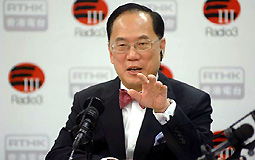
|
| Deficit downplay: Chief Executive Donald Tsang asked listeners not to worry about the anticipated Budget shortfall as it would not exceed the $100 billion surplus recorded last year. |
Chief Executive Donald Tsang asked people not to worry about an expected hefty deficit for Hong Kong this year resulting from the global financial crisis, saying it would not exceed the $100 billion surplus recorded a year ago.
Speaking on an RTHK talk show on his Policy Address this morning, he admitted he did not know how high the deficit would be. But, he said: "Let's not be worried. We've got reserves. Don't forget, a year ago we had a surplus of over $100 billion. Whatever deficit we're going to make this year is much less than $100 billion."
He stressed that the Administration was prudent.
"We don't borrow as a government. We try to balance our budget as much as possible. We use our money when it is needed. When there is surplus money we save."
To underscore the point, he added: "One has to be reassured. What's the purpose of a surplus, or a reserve, for that matter? To use it when you need it. This year we faced rampant inflation, affecting the lower income group. We had to do something. So we will face a relatively large deficit, but look at it in terms of the surplus we made the year before."
Banking regulations match world standards
The Government has no plans to strengthen Hong Kong's banking regulations in the wake of the Lehman Brothers minibond fiasco, Mr Tsang told listeners, adding the local finance industry is among the best regulated in the world.
He noted that Hong Kong had learned lessons from the 1997 financial downturn that would serve us well in the present crisis.
"First of all, we have cleaned up our own house," he said. "The banking regulation, the securities market regulation have all been touched up. We match up to the best standards coming from Basel" - recommendations on banking laws and regulations issued by the Basel Committee on Banking Supervision.
"At the same time we merged the futures and current market together and the settlement arrangment was brushed up. The banking system is a lot more solid and better regulated today than compared with 1997."
When there are allegations of malpractice - as in the case of the Lehman Brothers minibonds - the Government will address it, he said.
Banks' proposal a 'plea'
"The day before yesterday, I asked them [banks] to do something within this week to respond one way or another to a constructive idea we put across to them - to repurchase the paper at current market value," the Chief Executive said. "If they feel they are unable to do this, we can come up with some other measure."
Some of the minibonds are still valued at 60% to 70% of their original price, he said, adding many of those who invested in them are concerned a legal process would be lengthy and costly.
Asked to describe this proposal to the banks, Mr Tsang replied: "I don't think it's an ultimatum. It's not a request either. I'm making a plea to them as the Chief Executive. This is an important community issue."
Task force to unveil opportunities
In his Policy Address, Mr Tsang outlined plans to establish and chair a task force "to continually monitor and assess the impact of the financial tsunami on local and global markets, and provide timely evaluation of its impact on the local economy and our major industries during this trying period."
The task force will also propose specific options for the Government and business community to address the challenges, to help overcome the crisis, turn it into new business opportunities and enhance Hong Kong's competitiveness.
Asked to explain the need for such a body, which would include government officials, finance experts, economists and industry representatives, the Chief Executive said while the Government itself had expertise, he did not consider it sufficient "to look at the entire market and the entire spectrum from say securities, from banking, property, trading, logistics and so on."
"In terms of dealing with particular events throughout the world, we have contingency plans. We can deal with those things internally. What I do feel we are lacking, when these things happen, while we are dealing with the problems, I wonder whether internally, in the Administration, we have sufficient expertise to tell us there are opportunities in that for Hong Kong, in the longer and shorter terms.
"For that reason we need people around us not only to monitor events but to consider the implications for Hong Kong in a positive and a negative way."
|